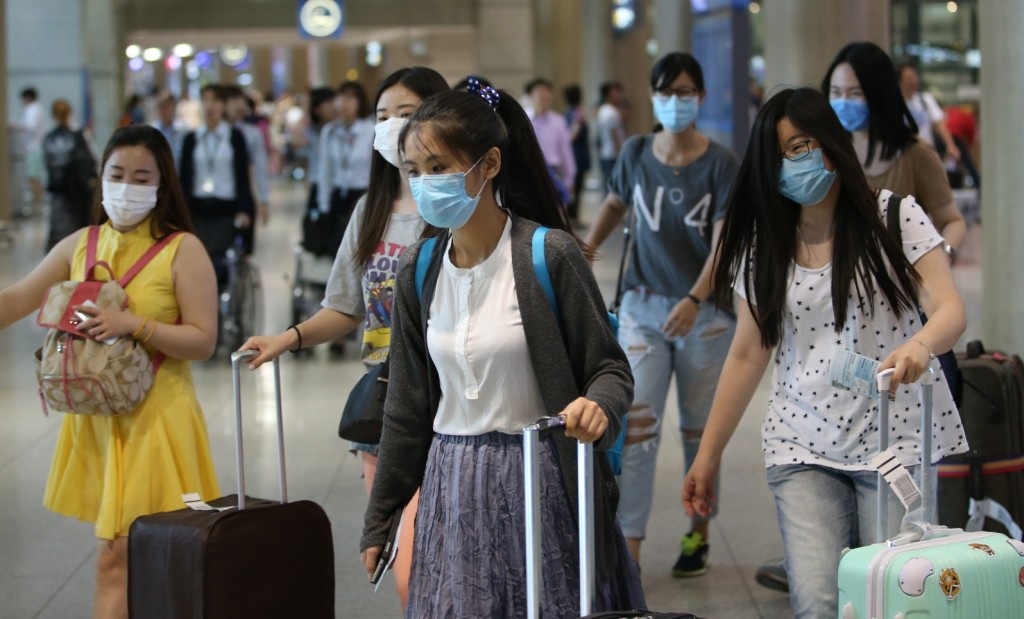- California Assembly OKs highest minimum wage in nation
- S. Korea unveils first graphic cigarette warnings
- US joins with South Korea, Japan in bid to deter North Korea
- LPGA golfer Chun In-gee finally back in action
- S. Korea won’t be top seed in final World Cup qualification round
- US men’s soccer misses 2nd straight Olympics
- US back on track in qualifying with 4-0 win over Guatemala
- High-intensity workout injuries spawn cottage industry
- CDC expands range of Zika mosquitoes into parts of Northeast
- Who knew? ‘The Walking Dead’ is helping families connect
MERS hits tourism industry

A group of foreign tourists wearing facial masks arrives at Incheon airport, west of Seoul, on June 2, 2015, as South Korea is gripped by increasing cases of the Middle East Respiratory Syndrome. The state-run Korea Tourism Organization said about 2,500 Chinese and Taiwanese tourists have called off their visits to South Korea as of June 1 due to the virus scare. (Yonhap)
By Kim Rahn
The outbreak of Middle East Respiratory Syndrome (MERS) is affecting the tourism industry, as people are canceling visits to Korea.
Some Koreans who planned trips to the Middle East are also having second thoughts, asking travel agencies about safety.
In Taiwan, about 1,300 people who planned to come to Korea have canceled their trips, according to the Korea Tourism Organization (KTO) and the Korea Association of Travel Agents, Monday.
“They include both group and individual tourists who booked tour programs through travel agencies,” a KTO official said.
He said that there have been no cancelations from China, Japan or other countries.
But industry watchers say it will take some more time to see whether the outbreak will really deal a blow to the industry because people usually book their holiday months before their actual visit.
The Ministry of Culture, Sports and Tourism and the KTO formed a taskforce to monitor the impact of MERS on the industry.
Samsung Securities researcher Jeon Jong-kyu said that whether the disease spreads further will be an important issue in China, which is the largest inbound market for Korea and where a Korean carrying the virus has been hospitalized.
“With the peak summer vacation season is approaching, Korea is the only country with a danger of MERS among Asian countries. Also Japan, Korea’s strong competitor in terms of tourism, is attracting tourists thanks to the weak yen. Such things combined will negatively affect tourism here,” Jeon said.
He said when severe acute respiratory syndrome (SARS) hit Hong Kong in 2003, it took three months after the epidemic settled down for the number of Chinese mainland travelers to Hong Kong rebounded.
The outbreak is affecting outbound trips as well.
An official of HanaTour, the nation’s largest travel agency, said the company is receiving calls from people who booked tours to the Middle East.
“They ask whether they should proceed with the trips, but are not canceling yet,” he said. “We are taking preemptive measures to prevent any risk, such as excluding desert tour programs that include camel rides.”
Fears and concerns are also make people refrain from visiting zoos, as it is said camels transmit the virus.
Seoul Grand Park, which runs the Seoul Zoo, had about 35,000 visitors over the weekend, about 60 percent down from the previous weekend’s 79,000. The park operator suspects the MERS fear and rain on Saturday were the cause of the decrease.















